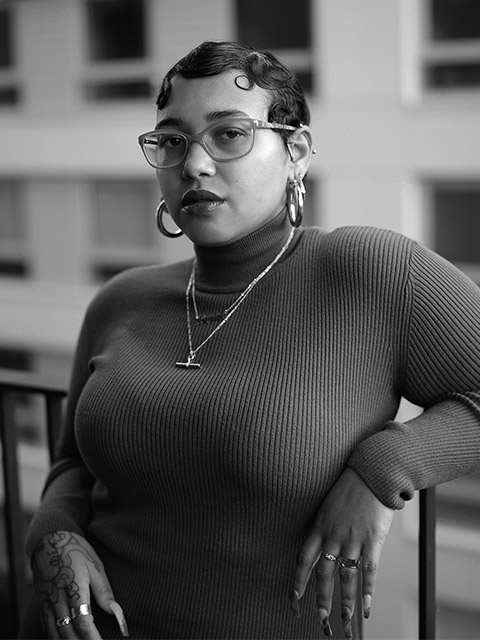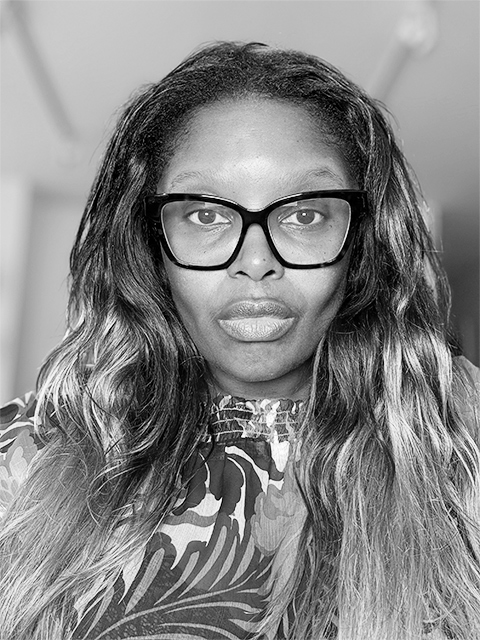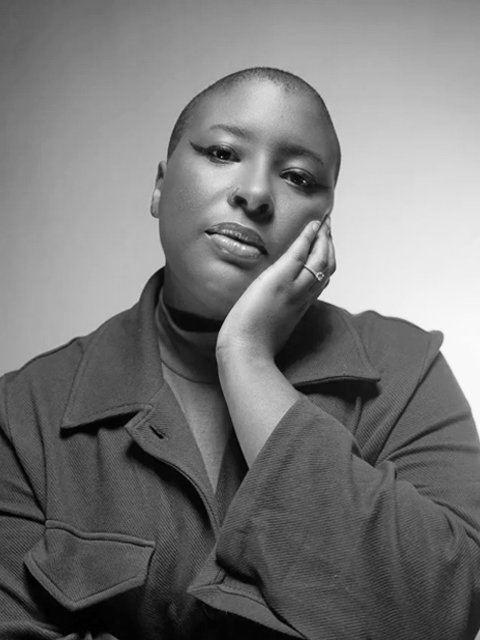How do algorithms shape narratives of women and femmes online? In what ways does bias in technology reinforce or challenge structural inequalities? And what role can art and culture play in resisting algorithmic injustice?
Artist Qualeasha Wood’s interdisciplinary practice transforms self-portraits into tapestries that reflect on bodily autonomy and the pressures of internet culture. In a world where identity is continually shaped and distorted in digital spaces, her work looks at how we see ourselves – and the impact on representations of race, gender and sexuality. Using Wood's tapestries as a jumping off point, the discussion will contemplate representation in digital spaces. Wood will be joined by Mutale Nkonde, a researcher and policy advisor advocating for policies and practices that promote the responsible development of AI systems.
The conversation will be chaired by creative computing artist and educator Jazmin Morris whose practice and research explores representation and inclusivity within technology. The discussion will last 45 minutes and attendees will be invited to submit questions to speakers after the conversation.

Jazmin Morris is a freelance Creative Computing Artist and Educator based in Yorkshire. She uses open-source tools to create digital experiences that approach social-political issues; with a specific focus on the complexities of simulating culture and identity in cyberspace.
Jazmin is a former academic and an associate lecturer at University of the Arts London. She dedicates a considerable portion of her practice to education, fostering critical creative questioning around computation and design. Jazmin still fantasises over web.1 and Super Mario 64.

Mutale Nkonde (she/her/hers) is a researcher and policy advisor advocating for policies and practices that promote the responsible development of AI systems.
Since 2020 she has been a member of US Tik Tok Content Advisory Council, advises their Responsible AI Team and assisted the Biden/Harris White House Public Sector engagement team to think through how to create national standards for AI. She is frequently invited by UN mechanisms to think about the integration of AI at the community level and leads the shareholder activist work at AI for the People, the non profit she founded during the pandemic.
Nkonde is pursuing a PhD at Cambridge University, has a BSc. (Hons) in Sociology from Leeds Metropolitan University, a Masters Degree from Columbia University. As well as formally holding fellowships at Harvard, Stanford and the Oxford Internet Institute.

In her textile practice, Wood brings together traditional craft techniques and contemporary technology. Her own image acts as a point of departure for works that explore racial, sexual and gender identity as they relate to the Black femme body.
As a digital native, Wood deftly navigates an internet environment that is at once a space of celebration and recognition for Black femme figures, as well as a politically loaded site for the ongoing marginalisation and exploitation of their selfhood and culture. Woods’ tapestries combine cybernetic and analogue processes; in her work, a pixel is equivalent to a stitch, each stitch an analogy for the past, present and future of Black femmehood, both on- and off-line, pre- and post-internet.
While Wood’s tapestries blend images from social media with religious, specifically Catholic, iconography, her ‘tuftings’ represent cartoon-like figures that recall the racist caricatures widespread in popular family programmes of the early-mid-20th century and beyond. As well as marking a technical shift from the artist’s tapestry pieces, the tuftings have a distinctly different visual style. In them, Wood adopts a naïve aesthetic that calls on the nostalgia of cartoon animations and their association with racial stereotyping to unpack notions of Black girlhood. Despite their formal simplicity, the tuftings reveal a lurking tension drawn from the artist’s own experiences of consuming media rife with anti-Black prejudice throughout her life. Where the tapestries are absorbed in consumption and cyber culture, the tuftings speak to inherited trauma and necessarily implicate accountability in the viewer.
From cut paper to generative AI, examining political dissent and erasure through the idea of collage.
Find out moreBanner image: Qualeasha Wood, Influencer [detail], 2025. Courtesy the artist and Pippy Houldsworth Gallery.
Images on page: 1) Jazmin Morris. Photographed by Christian Cassiel. 2) Mutale Nkonde, Courtesy the speaker. 3) Qualeasha Wood, Courtesy the artist. 4) Sabrina Tirvengadum and Mark Allred, Family [detail], 2023.
Autograph is a space to see things differently. Since 1988, we have championed photography that explores issues of race, identity, representation, human rights and social justice, sharing how photographs reflect lived experiences and shape our understanding of ourselves and others.